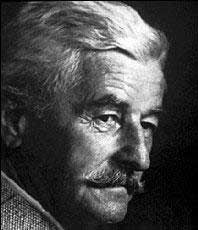VOICE ONE:
I'm Faith Lapidus.
VOICE TWO:
And I'm Steve Ember with People in America in VOA Special English. Today, we begin the story of the life of a famous Southern writer, William Faulkner. He wrote about an imaginary place and described changes in the American South.
(MUSIC)
VOICE ONE:

William Faulkner was born at the end of the 19th century. It was a time when there were two Souths in the United States. The first was the South whose beliefs had existed from before the American Civil War which began in 1861. This South did not question rules, even when those rules did not satisfy human needs. It was a South filled with injustice for black people. It held the seeds of its own destruction.
The other South was a land without any beliefs. It was a place where success was measured by self-interest. This was a South where each person had lost his place in the group. It was a place where people owned things that they did not know how to use.
Faulkner saw that the old beliefs were not right or even worth believing. And he saw that they could not provide justice because they were based on slavery. Yet he felt that even with their lies and half truths the old beliefs were better than the moral emptiness of the modern South.
VOICE TWO:
In Faulkner's story called "The Bear" a group of men are talking after the day's hunt. One man reads from a poem by the English writer, John Keats:
"'She cannot fade, though thou has not thy bliss, Forever wilt thou love, and she be fair. '
"He's talking about a girl," one man says.
The other answers, 'He was talking about truth. Truth is one. It doesn't change. It covers all things which touch the heart -- honor and pity and justice and courage and love. Do you see now. '"
The American writer, Robert Penn Warren says about Faulkner, "The important thing is the presence of the idea of truth. It covers all things that involve the heart and define the effort of man to rise above the mechanical process of life. "
VOICE ONE:
Faulkner has been accused of looking back to a time when life was better. Yet, he believes that truth belongs to all times. But it is found most often in the people who stand outside what he calls "the loud world. "
One of the people in his story "Delta Autumn" says, "There are good men everywhere, at all times. "
Faulkner's great-grandfather accepted the old beliefs. He was one of the men who had helped build the South, but his time was gone. Now money had replaced the old order of honor. What Faulkner saw was that there could be no order at all, no idea of doing what is right, in a world that measured success in terms of money.
VOICE TWO:

This is the changing South that Faulkner describes in the area he created. He named it Yoknapatawpha County. He describes it as in the northern part of the state of Mississippi. It lies between sand hills covered with pine trees and rich farmland near the Mississippi River. It has 15,611 people, living on almost 4,000 square kilometers. Its central city is Jefferson, where the storekeepers, mechanics, and professional men live.
The rest of the people of Yoknapatawpha County are farmers or men who cut trees. Their only crops are wood and cotton. A few live in big farmhouses, left from an earlier time. Most of them do not even own the land they farm.
The critic Malcolm Cowley says, "Others might say that Faulkner was not so much writing stories for the public as telling them to himself. It is what a lonely child might do, or a great writer. "
(MUSIC)
VOICE ONE:
William Faulkner was born in New Albany, Mississippi, in 1897. His father worked for the railroad. William's great-grandfather had built it. His grandfather owned it. When the grandfather decided to sell the railroad, William's father moved his family 35 miles west to the city of Oxford.
Growing up in Oxford, William Faulkner heard stories of the past from his grandmother and from a black woman who worked for his family. He heard more stories from old men in front of the courthouse, and from poor farmers sitting in front of a country store.
You learn the stories, Faulkner says, without speech somehow from having been born and living beside them, with them, as children will and do.
VOICE TWO:
Faulkner was a good student. Yet by the time he was 15 he had left school. Except for a year at the University of Mississippi at the end of World War One, that was the last of his official education.
He took a number of jobs in Oxford, but did not stay with any of them. He began to think that he was a writer. Then in 1918 the woman he loved married another man. Faulkner left Mississippi and joined the British Royal Flying Corps. He was sent to Canada to train to fight in World War One.
The war ended before he could be sent to Europe. He returned to Oxford, walking with difficulty because of what he said was a "war wound. "
VOICE ONE:
At home Faulkner again moved from one job to the next. He wrote bad poetry, drew pictures that looked like other men's pictures, and wrote uninteresting stories. A book of his poetry, The Marble Faun, was published in 1924.
A year later he went to the Southern city of New Orleans, Louisiana. There he met the American writer, Sherwood Anderson. They became friends. Anderson told Faulkner to develop his own way of writing, and to use material from his own part of the country. He also told Faulkner he would find a publisher for the novel Faulkner was writing. But Anderson also told Faulkner that he would not read the book.
VOICE TWO:
The book was called "Soldier's Pay." It would not be remembered today if it were not for Faulkner's later work. The same could be said of Faulkner's next book, "Mosquitoes."
Money from these books made it possible for him to travel to Europe. He educated himself by reading a large number of modern writers. Among them was the Irish writer James Joyce. From him, Faulkner learned to write about people's inner thoughts. He also read the books of the Austrian doctor, Sigmund Freud. From him, Faulkner learned some of the reasons people act in the strange way they often do.
Instead of remaining in Paris, as many American writers did, Faulkner returned to Mississippi and began his serious writing. "I was trying," he said, "to put the history of mankind in one sentence. " Later he said, "I am still trying to do it, but now I want to put it all on the head of a pin. " He created Yoknapatawpha County and its people, and gave them a meaning far beyond their place and lives.
(MUSIC)
VOICE ONE:
In 1929 Faulkner married Estelle Oldham, the woman he had loved since they were in school together. Her earlier marriage had failed. She had returned to Oxford with her two children.
They bought an old ruined house and began the costly work of repairing it. Faulkner also took on the job of supporting the rest of his family. His letters from this time on are often full of talk about what he must do to support his family and to continue the repairs to his house.
VOICE TWO:
Faulkner's next book, "Sartoris," presents almost all the ideas that he develops during the rest of his life. First, however, the book Faulkner wrote had to be cut by about 25 percent.
Faulkner resisted. He said, if you grow a vegetable, you can cut it to look like something else, but it will be dead. Yet, when Faulkner read the book after his editor cut it, he approved. He even cooperated in more re-shaping of the book.
In "Sartoris," Faulkner found his subject, his voice, and his area. He writes about the connection between an important Southern family and the local community. He describes how the Sartoris family seems to help in its own destruction.
VOICE ONE:
In the next seven years, between 1929 and 1936, he seemed to re-invent the novel with every book he wrote. "Get it down," he said. "Take chances. It may be bad, but that's the only way you can do anything good. "
At that time, most novels about the South described a land that never existed. After Faulkner, few northerners were brave enough to write about a South they did not know. And no serious Southern writer was willing to describe a South that did not exist.
(MUSIC)
VOICE TWO:
This program was written by Richard Thorman. It was produced by Lawan Davis. Our studio engineer was Michelle Dvinsky. I'm Steve Ember.
VOICE ONE:
And I'm Faith Lapidus. Join us again next week for the rest of the story about William Faulkner on People in America in VOA Special English.
Remembering six interesting Americans
Louis Kahn helped define modern architecture
The Man who declared himself emperor of the US
Hank Williams wrote songs about love and heartbreak
(來(lái)源:VOA 編輯:陳丹妮)
